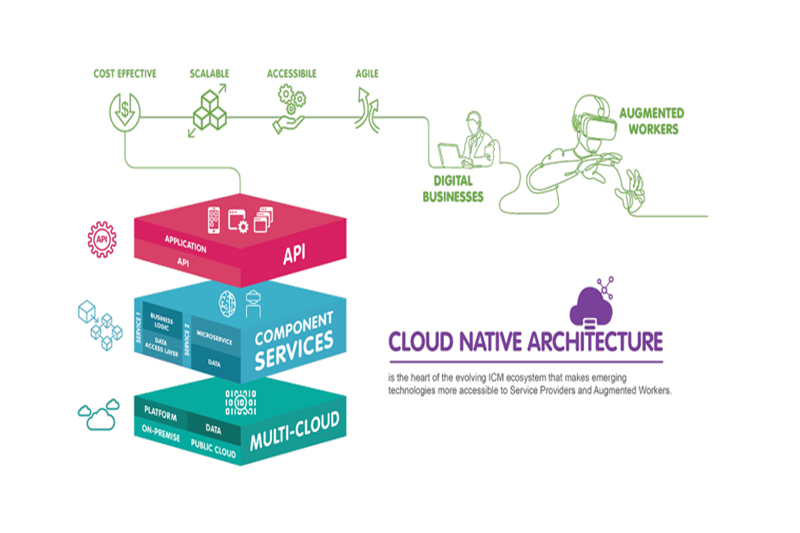
The services industry is undergoing an evolutionary journey with the developments in technology. Starting from simple tools, then gaining speed with the internet, to the prevalence of mobile technologies, a new dawn appears for services. Emerging technology underpins the way services will be conducted, and more will be expected.
A New World of Services
Embracing the future, Singapore has rolled out Services 4.0. Presently, the services industry accounts for 72% of Singapore’s GDP and 74% of national employment. It is undeniable that disruption will hit this sector hard.
Services 4.0 envisions Singapore’s service economy where services are offered and delivered using advanced technology to deliver end-to-end, anticipatory, frictionless and empathic services in a cloud native architecture.
Understanding what the future holds lies in what these jargons mean.
Anticipatory services refer to AI enabled services which can predict a user’s wants even before an indication is made by the user. AI is also able to create services which know how a user is feeling or thinking, thanks to its empathic quality. User-centricity allows for frictionless services – continuous service provided to the right consumer at the right time and place.
When operating in a cloud native architecture, a collection of technologies or services can be found within a stack or infrastructure on cloud. These include multi-cloud, emerging technologies offered as component services, and APIs. The triage are plug-and-play and use the best tool for each job. Ultimately, Cloud Native Architecture is at the heart of the infocomm media ecosystem, making technologies more accessible to service providers and augmented workers.
Augmented workers no do repetitive and mundane tasks, since machines can take over. Instead, their talents and edge in creativity, analytical thinking, emotional intelligence and human insights can be used in tandem with technology to improve decision making and final products.
With all these changes, there’s no reason to think technology’s got its head in the cloud. Adopting a Cloud Native Architecture is imperative to meet the changing needs of customers and gain competitiveness. Emerging technologies can help improve the quality and type of services, as well as grow employment opportunities. However, inertia looms.
According to one study, only 9% of global firms have succeeded in transitioning to Cloud Native. This is out of a possible 71% which have indicated their interest in transition.
Not to be sullied by the lack of enthusiasm, the Singapore Government has already made the move to migrate to Cloud Native Architecture by establishing the Singapore Government Technology Stack.
Tech Trends for Services Industry
Through the Services and Digital Economy Technology Roadmap (SDE TRM), Services 4.0 was identified as a potential engine for future growth. In consultation with local and international business leaders and technology experts, the TRM offers a projection of what the digital technology landscape will look like in the next 3 to 5 years. Key shifts and technology trends have been identified.
Nine key technological trends are listed:
- Pervasive adoption of AI
- Increasing sophistication of AI, with more context and common-sense awareness. AI will also be more empathic and display affective behaviour
- Man-machine interactions and collaborations will rapidly expand in multiple ways
- Technology interfaces are to become more natural
- Codeless development tools will be deployed
- Digital platforms and Everything-as-a-service architecture will enable seamless services
- Cloud deployment matures with hybrid and multi-cloud
- Blockchain will help decentralise trust
- The API economy will take off
Business are encouraged to focus on these through adoption, innovation and investment. In doing so, it will guide and speed up the development of strategic priorities and the enablers as described in the Digital Economy Framework for Action.
Whatever solution chosen, they should be cost effective, scalable, accessible, and supports the changing needs of service providers in an agile manner.
Singapore’s Ambitions for Services 4.0
What do these trends mean for Singapore? Three ambitions flesh them.
The first is to make Singapore a launchpad for Services 4.0. Making itself as a service hub, the aim is to make every business a digital one. More possibilities will be created for businesses in Singapore through emerging technologies.
Secondly, the Republic aims to build a competitive workforce in Singapore, augmented by technology.
Finally, a vibrant infocomm media ecosystem in Singapore that delivers Cloud Native solutions will bring emerging technologies closer to service providers and workers. This is the most critical of the three ambitions as it forms the foundation of the first two.
All in all, this will enable faster time to market from concepts to seamless services, and spur innovation. The Digital Economy Framework for Action, launched in May 2018, outlines recommendations to help realise these.
Every business has an opportunity to transform. IMDA’s Chief Executive, Mr Tan Kiat How said, “Leading business-to-consumer enterprises have already started their Services 4.0 journeys. Businesses of all sizes can benefit from the new technology shifts, and IMDA’s programmes will provide the support to help every business become a digital business.”
















